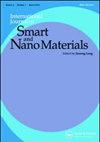纳米级裂纹缺陷单层氮化硼片断裂行为与裂纹尖端形状的关系
IF 6.6
3区 材料科学
Q2 MATERIALS SCIENCE, MULTIDISCIPLINARY
International Journal of Smart and Nano Materials
Pub Date : 2021-01-02
DOI:10.1080/19475411.2021.1885081
引用次数: 3
摘要
摘要氮化硼纳米片(BNNS)生长过程中经常出现纳米级缺陷,包括裂纹、圆孔和三角形缺陷。在本研究中,使用分子动力学(MD)模拟和有限元(FE)分析研究了具有不同裂纹尖端形状的手性BNNS的断裂行为以及纳米裂纹缺陷的相互作用。MD和FE结果均表明,具有两个裂尖(t=2)的BNNS的断裂强度显著高于具有一个裂尖的BNNS(t=1),其中Z字形(ZZ)方向的差异比扶手椅状(AC)方向的差别更明显,主要是由于裂纹尖端附近的结合角在ZZ方向上的变化比在AC方向上的更大。结果表明,BNNS的断裂强度与裂尖形状、手性角、缺陷与裂尖间距和偏转角密切相关。对照当前MD模拟和有限元分析进行检查表明,目前的结果是合理的。这项研究对于通过调节BNNS的裂纹尖端形状和纳米裂纹缺陷的相互作用来提高其断裂性能具有重要意义。图形摘要本文章由计算机程序翻译,如有差异,请以英文原文为准。
Fracture behavior dependent on crack-tip shapes in nanoscale crack-defect monolayer boron nitride sheets
ABSTRACT Nanoscale defects, including cracks, circular holes, and the triangular-shaped defects, often occur in the growth of boron nitride nanosheets (BNNS). In this study, the fracture behavior of chiral BNNS with different crack-tip shapes and the interactions of nanoscale crack-defects are studied using molecular dynamics (MD) simulations and finite element (FE) analysis. Both MD and FE results indicate that the fracture strength of BNNS with two crack tips (t = 2) is significantly higher than that with one crack tip (t = 1), in which the difference in zigzag (ZZ) direction is more obvious than that in armchair (AC) direction, mainly due to the fact that the change of bond angles near the crack tips is more substantial in the ZZ direction than those in the AC direction. Our results show that the fracture strength of BNNS strongly depends on crack-tip shapes, chiral angles, the defect-to-crack tip spacing and deflection angles. Checking against the current MD simulations and FE analysis shows the present results are reasonable. This study should be of great importance for enhancing the fracture performance of BNNS by modulating their crack-tip shapes and the interactions of nanoscale crack-defects. Graphical abstract
求助全文
通过发布文献求助,成功后即可免费获取论文全文。
去求助
来源期刊

International Journal of Smart and Nano Materials
MATERIALS SCIENCE, MULTIDISCIPLINARY-
CiteScore
6.30
自引率
5.10%
发文量
39
审稿时长
11 weeks
期刊介绍:
The central aim of International Journal of Smart and Nano Materials is to publish original results, critical reviews, technical discussion, and book reviews related to this compelling research field: smart and nano materials, and their applications. The papers published in this journal will provide cutting edge information and instructive research guidance, encouraging more scientists to make their contribution to this dynamic research field.
 求助内容:
求助内容: 应助结果提醒方式:
应助结果提醒方式:


